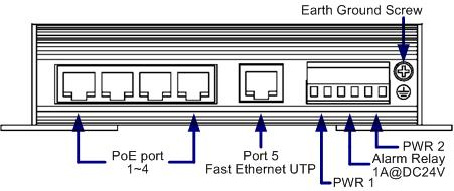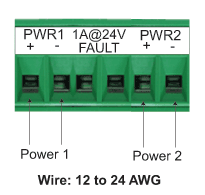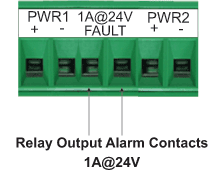
|  | RocketLinx ES7105 Installation OverviewUse the following overview and documentation to install the ES7105. If desired, mount the unit. Connect the grounding screw.
 Wire the power inputs. The voltage is 48VDC or -48VDC.
Insert the positive and negative wires (12 to 24 AWG)
into the V+ and V- contact on the terminal block connector.

Tighten the wire-clamp screws to prevent the DC wires from becoming loose.
Insert the wires and set the DIP switches using the following table.
After setting the DIP switches to ON, the relay output alarm detects any
power or port failures, and
forms a short circuit. The alarm relay output is Normal Open.

Wire the Earth Ground. Connect the appropriate Ethernet cables between the ES7105 Ethernet ports and the network nodes.
The Fast Ethernet ports support 10BASE-T and 100BASE-TX, full- or half-duplex modes.
All of the Fast Ethernet ports auto-detect the signal from connected devices to negotiate the link speed and duplex mode.
Auto MDI/MDIX allows you to connect another switch, hub, or workstation without changing straight-through or crossover cables.
Crossover cables cross-connect the transmit lines at each end to the received lines at the opposite end.
Always make sure that the cables between the switch and attached devices (for example, switch, hub, or workstation)
do not exceed 100 meters (328 feet).
10BASE-T: Category 3, 4, or 5 cable 100BASE-TX: Category 5 cable IEEE 802.3af: Category 5 or higher cable
|  |













